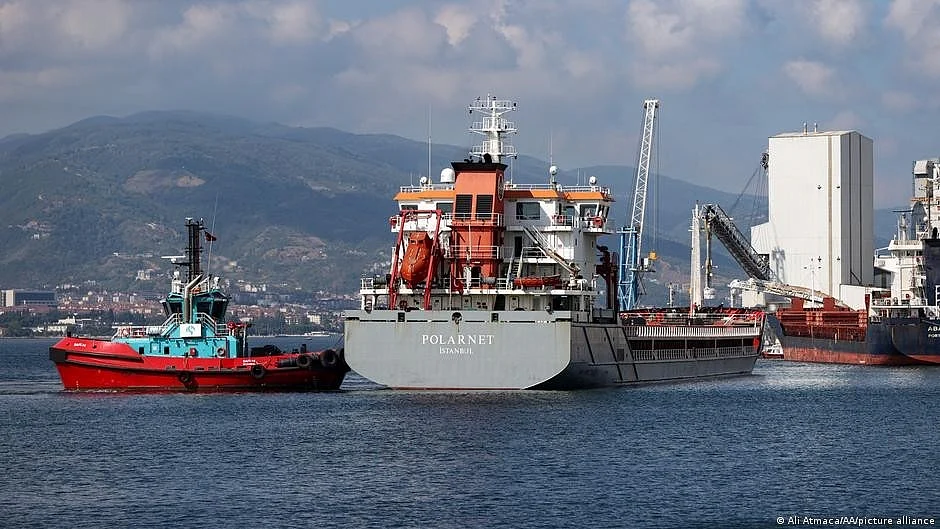How will the end of the Ukraine grain deal hurt Africa?
The Kremlin said it was pulling out after parts of the deal, agreed last July and extended several times, were never upheld

Russia this week withdrew from a deal brokered by the United Nations and Turkey to allow Ukrainian grain to be safely exported through the Black Sea.
The Kremlin said it was pulling out after parts of the deal, agreed last July and extended several times, were never upheld.
For several months last year, from the beginning of Russia's invasion of Ukraine, Moscow's warships blockaded grain exports from the port of Odesa and others, sending the price of wheat and other food commodities skyrocketing.
The lack of grain from Ukraine — known as the world's breadbasket — exacerbated a food security crisis, especially in the Middle East and Africa, where hunger is rife and grain imports are high.
There are now concerns about a repeat of that food crisis.
US Secretary of State Antony Blinken said by pulling out of the deal Russia was guilty of a "continued weaponization of food" that would harm millions of vulnerable people around the world.
Where is the biggest concern for food security?
The suspension of the grain deal means the main artery for global food exports has been severed, the World Food Program (WFP) told Germany's Deutschlandfunk radio.
Over the past two days, an index of wheat contracts listed in Chicago has risen more than 12% in reaction to Russia's withdrawal.
WFP said more than 70 countries already had large numbers of people going hungry, many in Africa. "This is going to make our ability to feed hungry people that much more difficult," Michael Dunford the World Food Program's (WFP) Eastern Africa director said separately.
Dunford also said that there were already 80 million people in the region who were acutely food insecure. A whole range of factors including conflict, climate change, economic shocks, and of course, the "hangover from COVID" were driving that. This suspension of the initiative would just exacerbate what is already a terrible situation, he added.
The International Monetary Fund (IMF) warned that Russia's exit "worsens the food security outlook and risks adding to global food inflation, especially for low-income countries."
Eastern Africa in particular, which is already battling severe hunger, is expected to be worst affected. For example, in Somalia's capital Mogadishu, wheat prices that doubled when Russia invaded Ukraine fell by a quarter after the deal was signed.
The country, along with Ethiopia and Kenya, has been facing the Horn of Africa's worst drought in decades.
Elsewhere, the Sudan conflict has led to more than three million people being displaced — and the potential new grain shortage could add to the difficulty in providing aid.
Some 350 million globally are currently affected by acute famine, according to the German Foreign Ministry website.
The Ministry cited data showing that for every one percent increase in food prices, an additional one million people are pushed into absolute poverty — noting how at one point last year grain prices rose 23%.
Russia has previously complained that the deal hasn't helped grain to reach poor countries, noting how most of Ukraine's exports went to China and countries outside of Africa.
What is the state of global food supplies?
Reuters news agency reported that global corn stocks began the 2021/22 season at a six-year low and so Russia's invasion of Ukraine led to a significant jump in prices.
A sharp increase in exports from Brazil, however, has since helped to boost supplies along with the reopening of Ukraine's Black Sea corridor last July.
Under the pact that created a safe shipping channel, Ukraine has been able to export 32.9 million tons of agricultural products, including 16.9 million tons of corn and 8.9 million tons of wheat.
Before the conflict, Ukraine was exporting roughly 25 to 30 million tons of corn a year, mostly through the Black Sea, and 16 to 21 million tons of wheat.
The US Department of Agriculture has forecast global corn stocks by the end of the 2023/24 season will be at a five-year high.Global wheat stocks are tighter, however, and are forecast to be at an eight-year low at the end of the 2023/24 season, USDA data show.
How likely is Russia to rejoin the grain deal?
The United Nations said it would try to get Russian representatives back to the negotiating table.
"The Secretary-General will continue to explore all possible avenues to ensure that Ukrainian grain or Russian grain and Russian fertilizer are out into the global market ... There are a number of ideas being floated," a UN statement said.
Turkish President Tayyip Erdogan said he believed Putin wants the deal to continue and would discuss it with him when they meet in person in August.
Moscow, meanwhile, has signalled it would only return to the grain deal if the rules are eased for its own exports of food and fertilizer, which are currently subject to Western sanctions. It gave the UN a three-month deadline to meet its terms.
Despite Western sanctions, Russia's own grain exports have benefited from last year's Ukrainian export blockade. Russia's share of global wheat exports was estimated to have grown to 22.3% in 2022 from 16.6% a year earlier, according to statistics from the International Grains Council.
Ukraine's market share dropped from 9.7% to an estimated 8.3% and by 2024 could have halved in just two years.
Follow us on: Facebook, Twitter, Google News, Instagram
Join our official telegram channel (@nationalherald) and stay updated with the latest headlines